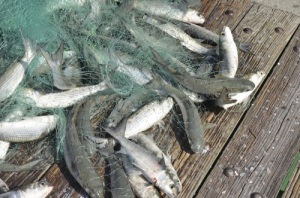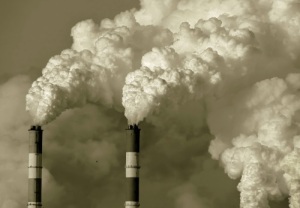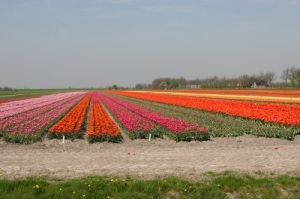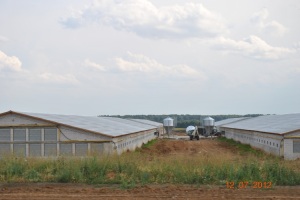Worldlog week 44 – 2014
Laat ik deze week beginnen met nieuws uit Europa. Onze Europarlementariër Anja Hazekamp is namelijk de strijd aangegaan voor een verbod op megavangnetten om mee te vissen. Talloze zwaardvissen en tonijnen leveren een lange doodstrijd in deze megavangnetten. Maar ook vogels, dolfijnen, walvissen en zeeschildpadden raken er onbedoeld in verstrikt en sterven een langzame verstikkingsdood.

De Verenigde Naties besloten al in 1992 dat drijfnetten verboden moesten worden, vanwege de overbevissing en massale bijvangst die ze veroorzaken. Maar de Europese Unie heeft de netten nog steeds niet definitief uit haar wateren laten verwijderen. Om definitief van drijfnetten af te komen stelt de Europese Commissie nu een totaalverbod voor. Super! Maar het blijft nog even spannend, want een groot aantal partijen in het Europees Parlement probeert het verbod op drijfnetten te blokkeren 🙁
Tevens heeft mijn collega Esther Ouwehand een motie ingediend om het handelsverdrag met Canada niet aan te gaan als het importverbod op teerzandolie niet wordt nageleefd. Teerzandolie is de meest vervuilende fossiele brandstof op aarde, goed voor drie tot vijf keer de CO2-uitstoot van conventionele olie.

Recent is door de Europese Unie een vrijhandelsverdrag met Canada afgesloten, waardoor het afgesproken importverbod op teerzandolie onmogelijk wordt gemaakt. Wij willen dan ook dat onze regering het vrijhandelsverdrag met Canada niet ratificeert!
En we blijven nog even in Europa. Want afgelopen week hebben we Kamervragen gesteld over de Europese subsidies voor de promotie van bloemen die veel gif bevatten. Het Bloemenbureau Holland ontvangt namelijk subsidie van de Europese Unie voor een promotiecampagne. Dit budget komt uit de subsidiepot voor Europese landbouwproducten en is speciaal bestemd voor voedsel (dus niet voor bloemen). Wij snappen niet dat de belastingbetaler daaraan zou moeten bijdragen.

Bij de teelt van bijvoorbeeld lelies (die met dit belastinggeld gepromoot wordt) wordt jaarlijks bijna 100 kg landbouwgif per hectare gebruikt, met alle gevolgen van dien voor onder andere de volksgezondheid, de waterkwaliteit en de biodiversiteit. Wij willen onder andere dat onze regering bezwaar aantekent bij de Europese Commissie tegen de promotie van bloemen!
Ook hebben we vorige week vragen gesteld over de indirecte investeringen van ambtenaren via pensioenfondsen in legbatterijen en megastallen in het buitenland. Het onderzoeksbureau Profundo heeft onderzoek gedaan waaruit blijkt dat Nederlandse financiële instellingen investeren in megastallen en in de ontwikkeling van de bio-industrie in het buitenland.

Wij hebben bijvoorbeeld begrepen dat het pensioenfonds van de Nederlandse ambtenaar aandeelhouder is van de megastal BRF in Brazilië. In deze megastal is geen wetgeving op het gebied van dierenwelzijn. Tevens was dit pensioenfonds aandeelhouder van de Thaise Charoen Pokphand, die megalegbatterijen bouwt in China. En had dit pensioenfonds de afgelopen vier jaar obligaties van het Braziliaanse vleesbedrijf Marfrig Alimentos. Wordt vervolgd!
Groet, Marianne
This week I would like to start with news from Europe because our MEP Anja Hazekamp has started fighting for a ban on mega fishing nets. Numerous swordfishes and tunas get stuck and struggle against death in these giant fishing nets. But also birds, dolphins, whales and sea turtles become entangled in these nets and slowly die of suffocation.

The United Nations already decided in 1992 that the use of driftnets had to be prohibited because it caused overfishing and massive by-catches. But the European Union still hasn’t had the nets removed from its waters. The European Commission is now proposing a complete ban to stop the use of driftnets permanently. Brilliant! But it still isn’t over yet because a large number of parties in the European Parliament are trying to block the ban on driftnets 🙁
Additionally, my colleague Esther Ouwehand filed a motion to not enter into a trade agreement with Canada if they do not observe the import ban on tar sands oil. Tar sands oil is the most polluting fossil fuel on earth, representing three to five times the CO2 emission of conventional oil.

The European Union recently entered into a Free Trade Agreement with Canada, which makes the agreed import ban on tar sands oil impossible. That’s why we call on our government to not ratify the Free Trade Agreement with Canada.
And we’re not leaving Europe yet. Last week we raised parliamentary questions about the European subsidies for the promotion of flowers that contain many toxins. It is a fact that the Bloemenbureau Holland (Flower Council) receives subsidy from the European Union for its promotion campaign. The budget is received from the subsidy scheme for European agricultural products and is especially intended for food (thus not for flowers). We can’t understand why the taxpayer has to contribute to this.
For example, 100 kilos of agricultural pesticides per hectare are used for the breeding of lilies (which are promoted with tax money) on an annual basis, with all associated consequences for public health, the quality of water and biodiversity. We call on our government to lodge a notice of objection with the European Commission to the promotion of flowers!
Last week we also raised questions about the indirect investments of public-sector workers through pension funds in battery farms and mega stables abroad. The research consultancy Profundo investigated this, and it appeared that Dutch financial institutions are investors in mega stables and in the developments of factory farming abroad.
For example, we learned that the pension fund of Dutch public-sector workers is a shareholder in the BRF mega stable in Brazil. There is no legislation for animal welfare in this mega stable. Also, the pension fund was a shareholder in Thailand’s Charoen Pokphand, which is building giant battery farms in China. And this pension fund also held bonds of the Brazilian meat company Marfrig Alimentos for the last four years. To be continued!
Greetings, Marianne